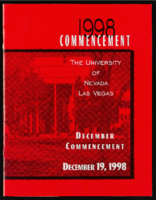Search the Special Collections and Archives Portal
Search Results

José Eliqué oral history interview: transcript
Date
Archival Collection
Description
Oral history interview with José Eliqué conducted by Barbara Tabach on January 17, 2018 for the Remembering 1 October Oral History Project. In this interview, José Eliqué discusses his responsibilities as the Associate Vice President and Chief of Police for the Department of Police Services at the University of Nevada, Las Vegas (UNLV). He talks about the Police Services Department and its mission to maintain a safe environment on campus. Eliqué discusses the night of the October 1, 2017 shooting and the procedures in place that helped the police officers and detectives support the survivors who made their way to the UNLV campus. He also provides details about using the Thomas & Mack Center as a place of refuge for survivors. In addition to his work in Las Vegas, which started when he moved to the city in 2000, Eliqué discusses his service in the US Navy and his career history in New York City and Chicago, Illinois.
Text

University of Nevada, Las Vegas (UNLV) 35th commencement program
Date
Archival Collection
Description
Commencement program from University of Nevada, Las Vegas Commencement Programs and Graduation Lists (UA-00115).
Text

Juliana Chen oral history interview: transcript
Date
Archival Collection
Description
Oral history interview with Juliana Chen conducted by Cecilia Winchell and Stefani Evans on March 21, 2021 for Reflections: The Las Vegas Asian American and Pacific Islander Oral History Project. In this interview, Juliana Chen shares her upbringing in Hunan, China and her experiences as a teenager training to become a professional ballet dancer. She discusses her rigorous training and troupe career that ended when Chen sustained a knee injury. With a desire to try something new while still being able to perform, Chen immigrated to Vancouver, Canada and began practicing magic. Chen shares that although she didn't know anyone or speak English, she practiced her craft and broadened her knowledge by joining professional organizations including the International Brotherhood of Magicians. After winning several magic competitions, Chen performed on the Las Vegas Strip at Caesar's Palace and the Riviera Hotel and Casino. She shares her current professional pursuits, her connection to the Las Vegas magician community, and her thoughts on Chinese culture and cuisine.
Text

Angela Castro oral history interview: transcript
Date
Archival Collection
Description
Oral history interview with Angela Castro conducted by Stefani Evans, Cecilia Winchell, Kristel Peralta, Vanessa Concepcion, and Ayrton Yamaguchi on November 05, 2020 for the Reflections: The Las Vegas Asian American and Pacific Islander Oral History Project. Castro begins the interview by talking about her early life, childhood, what Guam was like, and the history of her parents and grandparents. She describes the difference in public and private education in Guam and compares it to the United States. She explains the reason why she moved to Las Vegas, Nevada in 1998 and attended the University of Nevada, Las Vegas for public relations. Castro then talks about the differences between older and newer generations, the political atmosphere in Guam, and the differences between the United States and Guam in politics. She also talks about the discrimination she has experienced throughout her life and diversity in the workplace. Lastly, she describes her culture and traditions during holidays, the struggles with an absence of culture within her family, and her personal religious beliefs.
Text

Robert Kim oral history interview: transcript
Date
Archival Collection
Description
Oral history interview with Robert Kim conducted by Kristel Peralta, Cecilia Winchell, Ayrton Yamaguchi, and Vanessa Concepcion on March 05, 2021 for the Reflections: The Las Vegas Asian American and Pacific Islander Oral History Project. In this interview, Kim describes his career in law. He talks about his Korean roots, the model minority myth, and experiencing racial discrimination. Lastly, Kim discusses the Las Vegas Asian American and Pacific Islander (AAPI) community, his involvement with the Asian Bar Association of Las Vegas, and the importance of electing Asian Americans into political positions.
Text

Marvelys Lopez Omaña oral history interview: transcript
Date
Archival Collection
Description
Oral history interview with Marvelys Lopez Omaña conducted by Monserrath Hernandez and Barbara Tabach on February 21, 2020 for the Latinx Voices of Southern Nevada Oral History Project. In this interview, Marvelys Lopez discusses her childhood and growing up in Caracas, Venezuela, where her father owned a toy store. She attended an all-girls Catholic School and from a young age knew that she wanted to be a doctor. In 1993, at the age of seventeen, she was able to study abroad in the United States for one year and moved to Las Vegas, Nevada. She returned to Venezuela to attend medical school and while attending medical school she met her husband, who was studying to be a registered nurse at the time. Lopez Omaña recalls volunteering as a firefighter in Venezuela, and discusses the political change that happened in Venezuela during her last years in medical school. She moved to back Las Vegas with her husband in 2003 and began working as a caregiver. She recounts Her first son's birth story, and describes how she became a Certified Professional Midwife.
Text

Transcript of interview with George Pollak by Claytee White, May 25, 2010
Date
Archival Collection
Description
George was raised in Mattapan, a suburb of Boston, by his mother and father. George had four siblings and was the second youngest. George shares fond memories of growing up and playing softball and tennis in the neighborhood park with his numerous friends. George could listen to a song on the radio and play it on the piano by ear when he was as young as four years old. George had several jobs to earn money growing up, including working in a record store and as a busboy. Eventually George and his brother joined a trio with Steve Harrington and performed in clubs. In 1958, George joined his brother and Paulette Richards in Las Vegas where they had a contract to play at El Rancho Hotel & Casino where they played until it was destroyed by fire. Following the fire, George and his brother parted ways and each did their own thing. In the 1960s, George began playing with the band at Caesars Palace. George used his background in accounting to do some bookkeeping and payroll for some of the ban
Text

Bryan Chan oral history interview: transcript
Date
Archival Collection
Description
Oral history interview with Bryan Chan conducted by Vanessa Concepcion, Cecilia Winchell, and Stefani Evans on October 18, 2021 for Reflections: The Las Vegas Asian American and Pacific Islander Oral History Project. Bryan Chan discusses his life growing up in California, his family's migration stories to the United States, and his education. He discusses his appearance on a reality television show which led to becoming a singer for boy band LMNT. Bryan talks about his entertainment career, including his move to Las Vegas to sing and host for the Chippendales show at the Rio Hotel and Casino. He also shares insight into his family's traditions and his favorite foods that his father and grandmother cooked. Subjects discussed include: chain migration; Chippendales; giglife; virtual events; traditional foods.
Text

Yazmin Beltran oral history interview: transcript
Date
Archival Collection
Description
Oral history interview with Yazmin Beltran conducted by Rodrigo Vazquez and Barbara Tabach on February 4, 2019 for the Latinx Voices of Southern Nevada Oral History Project. Beltran discusses her early life in Mexicali, Baja California, Mexico and her childhood and upbringing in Mexico. In 2003, at the age of eighteen, she and her mother joined the rest of her family in Las Vegas, Nevada. After attending College of Southern Nevada and taking English as a Second Language classes, Yazmin began to write as a Spanish contributor for a publication in Reno, and became a writer for Spanish publications in Las Vegas, including El Tiempo, El Mundo, and Univision. Beltran's work for Univision led her to Texas, where she covered events and crises including the 2018 child separation occurring at the United States border, which she discusses in the interview. Finally, Beltran talks about being a journalist for The Nevada Independent and the importance of continuing to report in Spanish.
Text

Jimmy Lee oral history interview: transcript
Date
Archival Collection
Description
Oral history interview with Jimmy Lee conducted by Vanessa Concepcion, Kristel Peralta, and Stefani Evans on May 25, 2021 for Reflections: The Las Vegas Asian American and Pacific Islander Oral History Project. Jimmy shares his family's history as entertainers and producers in Korea and their migration to the United States when Jimmy was six years old. He talks about their move to Durham, North Carolina and their relocation to Las Vegas, his education, and his current business, mentorship, and philanthropic pursuits. Subjects discussed include: Arirang Sisters; Jo Mackey Sixth Grade Center; Nevada's tax structure; Commercial Center.
Text
